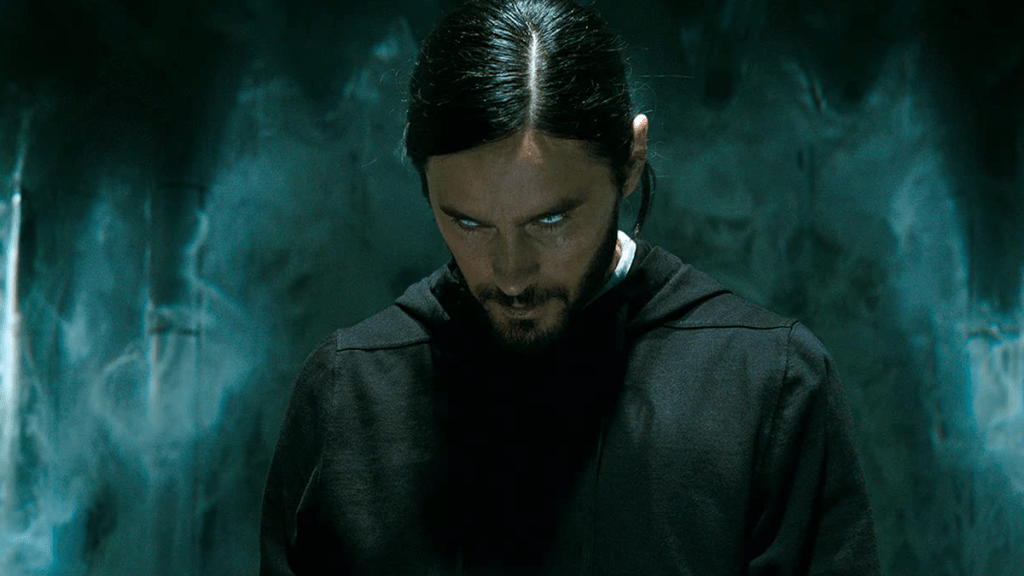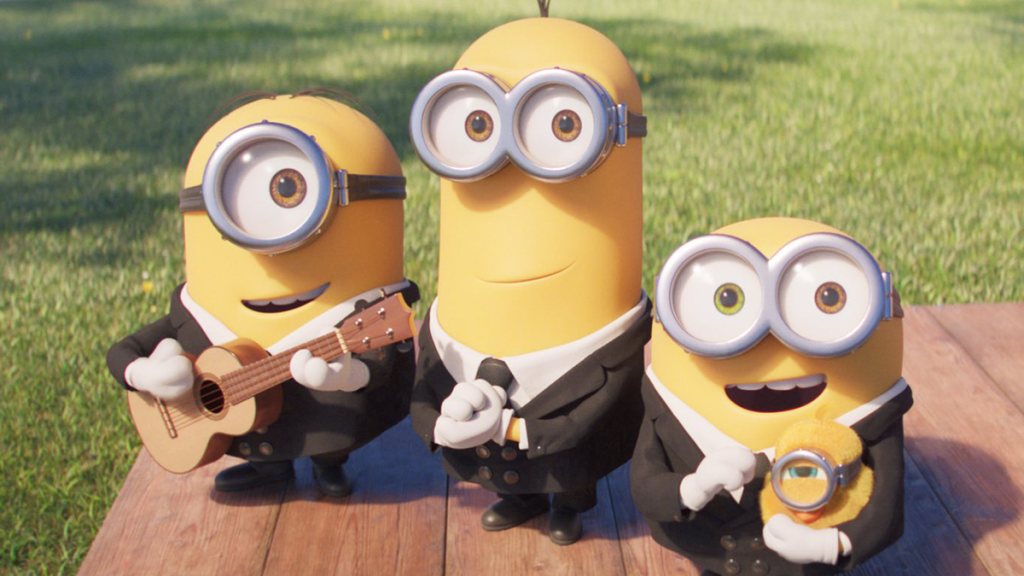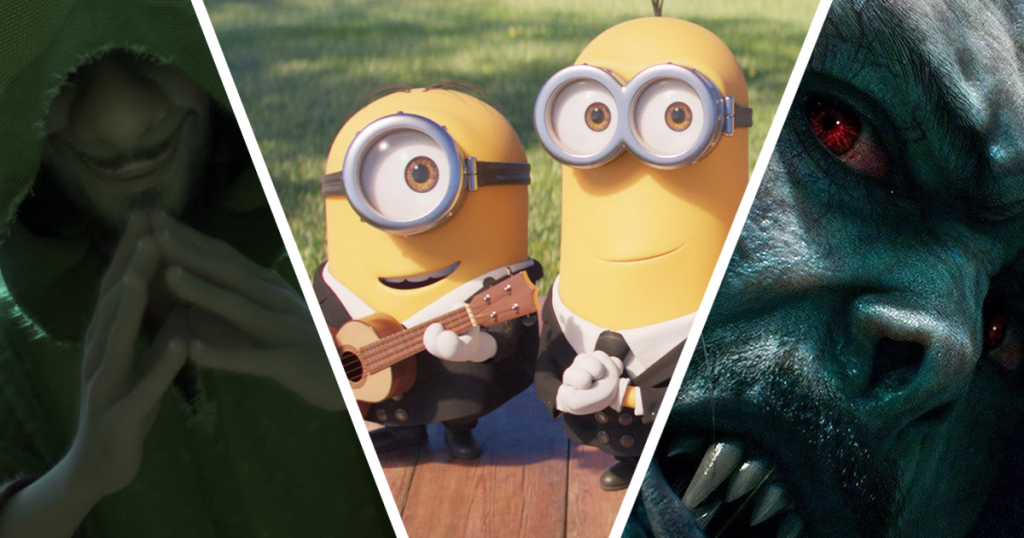
Best of 2022 is ComingSoon’s weeklong celebration of the entertainment that made this past year so memorable.
People who are chronically online (myself included) like to think that the internet has way more of an impact on the real world than it actually does. They spend so much of their time sharing their thoughts on anything and everything and passionately debating about their likes and dislikes that they cannot fathom the idea that all of their arguments, praises, and pleas might not actually matter in the grand scheme of things.
Unfortunately for them, it is usually the case that the words people send into the ether of social media don’t actually have any meaningful effect on society at large. Sometimes, though, the weird corners of the internet manage to actually make an impact outside the digital world. The few times it managed to do so with the movie industry in 2022 were certainly ones for the history books.

Encanto
Disney and Pixar animation had a rough time at the box office in 2022. Neither Lightyear nor Strange World was a box office success. The studios had a much better year on Disney+, with the successful release of Turning Red and even more so with the phenomenon that Encanto became.
While it was technically released in 2021, Encanto didn’t exactly blow up until it hit Disney+ at the end of the year and really kicked into high gear in 2022. A lot of this had to do with people really taking to the soundtrack, with one song in particular making a record-breaking splash on the charts.
“We Don’t Talk About Bruno” had a lot going for it that paved it’s path to hitting milestone after milestone, and it likely would have been pretty big even if the internet hadn’t fallen in love with it. But these days, one social media platform actually has a huge influence over the music charts.
Yes, for all the flack TikTok gets for… well, mostly for being something teenagers are into, it does have a considerable grip on the music industry. Artists have even caught onto this and have started trying to create dances for their songs to go viral on the site and thus climb up the charts. But Disney didn’t need to beg the teens to make videos about “We Don’t Talk About Bruno”, and there was no viral dance associated with it (though some folks did try to recreate the choreography from the film in interesting ways). The song just inspired creativity in people, which resulted in a bunch of different videos with the only real common denominator being the track itself.
Given that the platform’s users jumped onto this song as soon as the movie was out (or at least as soon as it hit Disney+ a month later) we’re going to assume TikTok probably does deserve at least some credit for the song’s success. Without its influence, “We Don’t Talk About Bruno” may have made a dent on the charts, but probably not hit all of the major milestones it did, including becoming Disney’s longest-reigning chart-topper for Disney in the history of the US Billboard Hot 100 (yes, it was even bigger than Frozen’s “Let It Go”).

John Krasinski as Mr. Fantastic
Fan castings for big franchises are nothing new, but sometimes certain ones catch wind online and become a collective “headcanon” for many people in a fan community. Needless to say, most of these fandom dreams don’t actually end up coming to fruition, and the fans generally move on, accepting the decision made by the studio and coming up with celebrities to play other characters they love.
But sometimes fans do end up getting what they want, as was the case in 2022’s first Marvel Cinematic Universe movie, Doctor Strange in the Multiverse of Madness. While the movie didn’t include as many Marvel character cameos as a lot of fans wanted, they did bring back Patrick Stewart as Charles Xavier from the X-Men movies along with a few other alternate versions of Marvel characters previously seen on the big and small screens, including one that has left people with more questions about the future of the franchise.
Many Marvel fans have wanted real life married couple John Krasinski and Emily Blunt to play the MCU versions of Reed Richards/Mr. Fantastic and Sue Storm/Invisible Woman. The demands for Blunt declined once she made it pretty clear in interviews that she was in no way interested in starring in a superhero movie, but the hopes for Krasinski’s involvement carried on.
Krasinski did end up appearing as the MCU’s Reed Richards, at least the one from Earth 838 (an alternate universe) in Doctor Strange in the Multiverse of Madness. But like all the other cameo characters in the film’s Illuminati team, Mr. Fantastic was quickly killed off. However, that doesn’t necessarily mean Krasinski’s time in the franchise is over. As seen in the Doctor Strange sequel and other recent projects, some alternate versions of MCU characters are played by the same actor, while others aren’t. The inclusion of Krasinski as Mr. Fantastic in this particular movie was most likely a nod to the fan casting rather than a firm commitment to keeping him in the role long term, but there’s still a chance he could return as the main timeline’s Reed Richards in the upcoming Fantastic Four movie.

#MorbiusSweep
On social media, everything is either wildly hyped or brutally picked on. There’s rarely any in between. But sometimes it can be difficult for those not in the know to tell whether something is receiving genuine praise, sincere backlash, “mean” terms of endearment, or ironic accolades.
Other than the Spider-Man movies co-produced with Marvel Studios, Sony’s recent films based on the web-slinging franchise have not been well-received from a critical standpoint. But while both of their Venom movies did well at the box office, the same cannot be said for 2022’s Morbius. Telling the story of the fairly obscure Marvel Comics character described as “the living vampire”, the movie was released (after several pandemic-related delays) on April 1, 2022. But the real April Fools turned out to be the executives at Sony. Not because the film received poor critical reviews, audience reception, and box office returns (which it did), but because they not only listened to the internet, but did something even worse: they misinterpreted it.
Even before it came out very few people expected Morbius to be anything close to a good movie. Its seemingly inevitable terribleness was a running joke on the internet months before it came out. Like many internet jokes, it soon evolved into another, with people soon going from outright trashing the film to ironically praising it. Lines like “It’s Morbin’ Time!” (a knockoff of a famous Power Rangers catchphrase) and the hashtag #MorbiusSweep (in reference to the Oscars and other awards) soon became prominent on social media.
These jokes picked up after the movie came out and actually did flop. The gags got so big that Sony executives caught wind of them. It seems they only saw the ones about “Morbin’ Time” and other “enthusiastic” responses to the movie, though, because they decided to rerelease the movie in cinemas a couple of months later, somehow believing the ironic excitement about the film would translate into ticket sales.
Unsurprisingly, the movie bombed again (which, of course, became a meme in and of itself) but this does go to show that studio executives are paying attention to social media trends. Whether or not they understand them, however, is another thing.

Gentleminions
Soon after Morbius flopped for a second time, a prominent meme was born out of another movie. After a five-year hiatus (two years longer than anticipated, again due to the COVID-19 pandemic) the ever-popular Despicable Me franchise released its fifth installment. Serving as a sequel to 2015’s Minions spin-off, Minions: The Rise of Gru spawned a meme that had the opposite effect as the aforementioned Morbius ones.
Many families with young children who went to see The Rise of Gru were in for a bit of a shock at the movie theater when they found it wasn’t just young children and their parents eager to see the latest Minion adventures. All around the world, groups of teenagers were gathering together to see the film, and following a peculiar dress code for a casual cinematic establishment.
After briefly joking about it on the internet, teenagers across the globe started showing up to the movie in droves, dressed in their best suits. The “Gentleminions”, as the official Minions social media would quickly dub them, became a viral TikTok trend, which, of course, quickly prompted more Gentleminions (as well as young women; some also wore suits while others opted for formal gowns) to head out to the movies.
Dressing a specific way to attend a movie is nothing new, but when people do this it’s usually in the form of wearing a t-shirt with the film’s logo on it or cosplaying a character. And occasionally, a certain color will be encouraged to be worn within a fandom, like wearing white to Black Panther: Wakanda Forever in tribute to the late Chadwick Boseman (people are also already planning to wear pink to the upcoming Barbie movie). But formal wear at the movies is usually reserved for big premieres, making the Gentleminions an (intentional) anomaly.
This trend was mostly in good fun and may even have served as an excuse for teens who loved the Despicable Me franchise as kids to see the latest installment while still being viewed as “cool”; most teenagers in 2022 would have been toddlers or young children in 2010 when the first movie came out, making them the prime age demographic for the franchise all the way up through 2017, when the most recent film was released.

However, some groups of Gentleminions caused damage beyond puzzling a few parents bringing their children to the cinema. Some of the groups would throw banana peels at the screen, create mosh pits in the auditorium, and just generally take their enthusiasm (whether it be genuine or ironic) a little too far. It got to the point where some theaters put signs on their doors saying that anyone wearing a suit would not be admitted to The Rise of Gru.
How much of an impact the Gentleminions had on the Minions prequel’s overall box office is unknown (though it was pretty widespread, with sightings reported all around the world) but the meme was certainly the opposite of the Morbius one — likely because a key part of it was to actually go and see the movie, rather than feign intense enthusiasm for the film without actually knowing anything about it. So whether the Gentleminions’ actions were genuine, ironic, or somewhere in between, they definitely had an overall positive impact on the film’s box office.

Glass Onion Hits the Big Screen
There’s been a lot of talk in recent years about how the mid-budget movie is disappearing, at least from cinemas. Knives Out appeared to be a beacon of hope for this kind of movie when it was a surprise theatrical success in 2019, but then the pandemic began in 2020 and box office hopes for films of this style were dashed even further. Hope returned when a sequel to Knives Out was announced … and then dashed again when Netflix bought the rights to the film (and a third movie in the franchise).
Netflix was upfront from early on about its intention to make the movie, which would later be called Glass Onion, for its streaming service only, meaning there would be no theatrical showings of the film outside of festivals. Fans were outraged by this, not only because they wanted to see the movie in theaters but because they didn’t want the cinematic experience to be largely limited to action blockbusters. This was about more than just one movie, and people made it clear they would be willing to shell out money to see Glass Onion on the big screen.
In fall 2022, just a few months before the movie’s streaming release, Netflix finally relented. Well, sort of. The studio announced that Glass Onion would be shown in select cinemas for one week and one week only. This compromise wasn’t exactly what fans wanted, but those who were able to go see it in theaters did so, making the movie gross an impressive $15 million during that week (against a budget of $40 million).
Glass Onion then went on to be viewed by over 32 million households during its first week on Netflix that December, so it was definitely a success for Netflix. It’s too early to say whether or not the third film in the franchise will get the same limited theatrical treatment, but at the end of the day, Netflix isn’t concerned with cinemas (they’re the competition of streaming, after all). Hopefully, though, Glass Onion’s theatrical success encourages other studios to put more mid-budget movies like it on the big screen.

